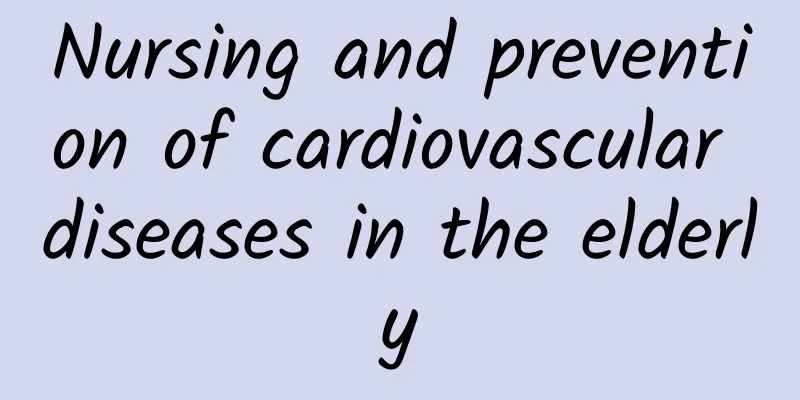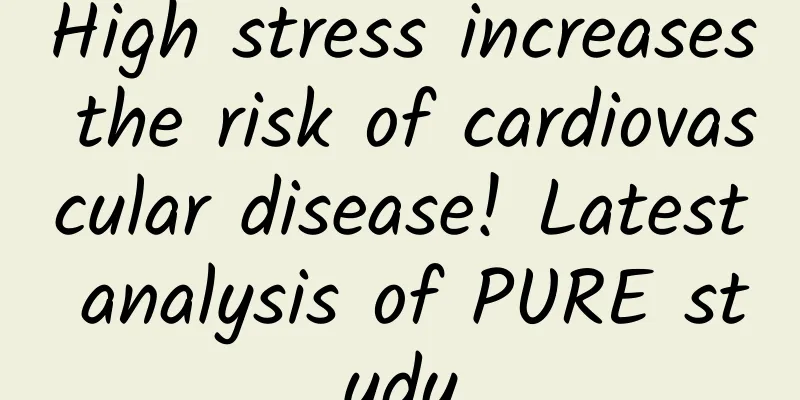Nursing and prevention of cardiovascular diseases in the elderly

|
As people age, the prevalence of cardiovascular disease in the elderly gradually increases. Cardiovascular disease not only harms physical health, but also has a direct impact on economic and family life. Therefore, the elderly should strengthen their understanding of cardiovascular disease and take scientific and effective preventive measures. 1. Overview of cardiovascular diseases in the elderly Cardiovascular diseases mainly include coronary heart disease, angina pectoris, myocardial infarction, hypertension, arteriosclerosis, palpitations, etc. Among them, coronary heart disease, hypertension and arteriosclerosis are the most common cardiovascular diseases in the elderly. Coronary heart disease is a disease caused by insufficient blood supply to the heart. Coronary heart disease in the elderly is mostly caused by arteriosclerosis, and clinical manifestations include chest pain, shortness of breath, palpitations, etc. Hypertension refers to excessive pressure on the blood vessel walls when blood flows in the blood vessels. Common clinical manifestations include headache, tinnitus, palpitations, fatigue, etc. Atherosclerosis is caused by the formation of plaques of lipids in blood vessels, which harms the cardiovascular system. Clinical manifestations include headaches, dizziness, body pain, etc. The morbidity and mortality of cardiovascular diseases in the elderly are several times that of young people. This is mainly due to the gradual aging of the elderly's body, accompanied by a decline in metabolic function, a slowdown in blood flow, an increase in coronary artery sclerosis, hypertension and other conditions. These factors will lead to the aggravation of cardiovascular diseases and more serious consequences. Therefore, it is crucial for the elderly to reasonably prevent and treat cardiovascular diseases. 2. Cardiovascular disease care for the elderly 1. Medication The treatment of cardiovascular diseases in the elderly needs to rely on the support of drugs. Generally speaking, different treatment plans are used for different cardiovascular diseases. For example, antihypertensive drugs can be used to control blood pressure levels for the treatment of hypertension in the elderly; drugs can be used to dilate blood vessels and improve blood supply to the heart for coronary heart disease; antiplatelet aggregation drugs can be used for arteriosclerosis to reduce plaque formation. 2. Diet adjustment Dietary adjustments for cardiovascular diseases in the elderly are mainly to control dietary calories, reduce gastrointestinal burden, and prevent excessive intake of fat, high-cholesterol foods (such as fatty meat, sausages, egg yolks, etc.) and high-sodium foods (such as soy sauce, pickles, etc.). At the same time, it is necessary to increase the intake of foods and fruits rich in dietary fiber, such as whole grains, vegetables and fruits. These foods are rich in fiber, vitamins and minerals, which help to reduce the burden on the heart and lower cholesterol and blood lipid levels. 3. Exercise properly Moderate exercise is good for the health of the cardiovascular system of the elderly, but it needs to be done under the guidance of a doctor. Under normal circumstances, the elderly should do moderate exercise for more than 30 minutes every day, such as walking, jogging, swimming, etc. Exercise can not only promote cardiovascular exercise and enhance muscle strength, but also maintain a good mental state and help relieve the symptoms of cardiovascular disease. 4. Do not smoke or drink alcohol Smoking and drinking are risk factors for cardiovascular disease in the elderly. Long-term smoking can put the cardiovascular system in a dangerous state, causing the blood vessel walls to become fragile and prone to thrombosis. Therefore, the elderly should quit smoking and drink less to reduce the incidence of cardiovascular disease. 5. Maintain psychological balance It is important for the elderly to maintain a balanced and healthy mental state. Excessive tension, mental anxiety and stress can affect cardiovascular health, so the elderly need to maintain a balanced mind and avoid excessive anxiety and stress. 3. Prevention of cardiovascular diseases in the elderly 1. Eat a healthy diet A reasonable diet is the primary measure to prevent cardiovascular disease. The elderly should control dietary calories and fat, increase dietary fiber intake, and maintain an appropriate amount of water intake. 2. Reasonable amount of exercise Moderate exercise can help prevent cardiovascular disease. The elderly should increase their daily physical exercise and outdoor activities to enhance their body's immunity and improve their cardiopulmonary function and metabolic capacity. 3. Maintain good living habits The elderly should avoid indulging in bad habits such as staying up late, drinking excessively or staring at the computer for a long time, and pay attention to ensuring adequate sleep time and good sleep quality to allow the body to get sufficient rest and repair. 4. Check regularly Elderly people should have regular heart and vascular system examinations, such as measuring blood pressure, checking electrocardiograms and cardiac ultrasound, to promptly detect and prevent the occurrence of cardiovascular diseases. 5. Special care For the elderly, special attention should be paid to the prevention, care and treatment of cardiovascular diseases. For different diseases, the elderly also need to take corresponding treatment methods, such as maintaining a balanced mentality for angina pectoris; coronary heart disease and hypertension require a reasonable diet and moderate exercise. Cardiovascular disease is a serious health problem faced by the elderly. The elderly should strengthen their awareness of cardiovascular disease and make preventive measures a habit in their daily lives. Through persistent efforts, the cardiovascular health of the elderly can be effectively protected, their quality of life and sense of happiness can be improved, and they can enjoy health and longevity. (Zhou Xingxing, Lingshou County People's Hospital, Shijiazhuang City, Hebei Province) |
>>: How to prevent and care for cardiovascular disease?
Recommend
What to do if you have amenorrhea and how to treat it
Nowadays, many women have the problem of amenorrh...
When is Matsutake available? How to eat Matsutake
Matsutake, also known as pine mushroom, combined ...
What kind of exercise can I do during my period?
Many female friends cannot do anything during thi...
What should I do if one of my baby's breasts is bigger than the other when feeding?
Many women choose to breastfeed. Some women have ...
Can pregnant women eat fried squid?
By the third month of pregnancy, most women have ...
Avoid misunderstandings and don’t let fitness hurt your body
Fitness seems to be the only way to stay in good ...
Natural childbirth has many benefits
Natural childbirth is also called normal childbir...
Many areas have seen adult paralysis "soft disease", which was eventually confirmed to be related to this
I have obviously gotten enough sleep and eaten en...
Is it reliable to judge the gender by acidophilicity and alkaliphilicity?
Many women are eager to know the gender of their ...
Do girls grow taller during their periods?
There are many misunderstandings in our lives, es...
What vegetables are used to make wontons in summer? Is wonton a wonton?
Wontons are called differently in different regio...
My biggest buttocks
The size of the butt is directly proportional to ...
Why is menstrual blood bright red?
Menstruation is like a barometer, constantly remi...
How to relieve labor pains for pregnant women
Pregnant women are more likely to experience cont...
Does the ovulation test paper have one dark and one light?
The ovulation test paper is a kind of pregnancy t...









